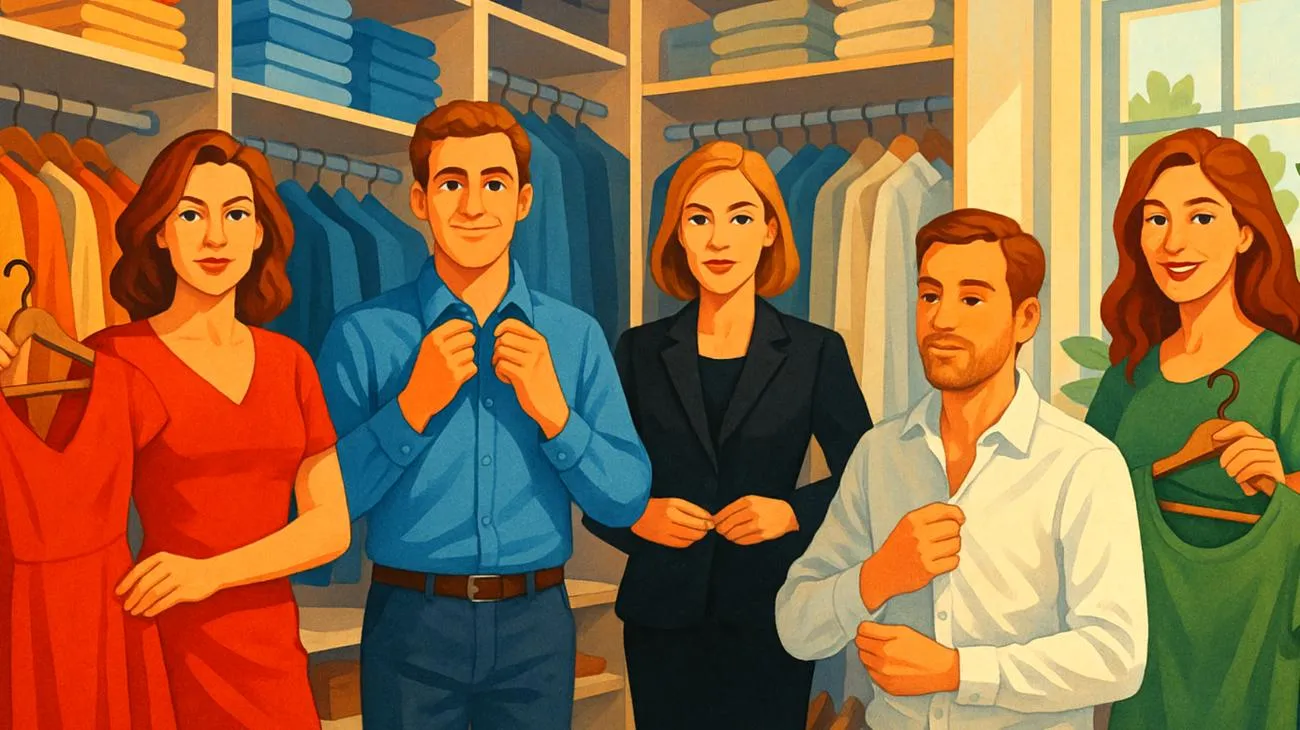Here Are the 5 Clothing Colors That Reveal Your True Personality, According to Psychology
Picture this: you’re standing in front of your closet, running late for work, and your hand instinctively reaches for that same navy shirt you wore twice this week. Or maybe you’re the person who gravitates toward that fiery red dress whenever you want to feel unstoppable. What if we told you that these seemingly random wardrobe choices are actually broadcasting hidden messages about your personality to everyone around you?
Here’s the plot twist that’ll make you rethink your entire closet: recent psychological research reveals that our clothing color preferences aren’t just about looking good or matching our shoes. They’re unconscious signals about our deepest personality traits, emotional states, and even our secret aspirations. Scientists have discovered a fascinating phenomenon called enclothed cognition, which basically means that what you wear doesn’t just reflect who you are—it actually influences how you think, feel, and behave.
Research published in Frontiers in Psychology found significant relationships between personality types and color preferences, showing that certain colors consistently correlate with specific psychological traits. While these connections aren’t crystal ball predictions of your entire character, they offer surprisingly accurate insights into your motivations, social tendencies, and inner world. The colors you instinctively reach for each morning might be revealing more about your personality than your closest friends know.
The Mind-Blowing Science Behind Color Psychology
Before we dive into what your favorite colors are secretly saying about you, let’s get the science straight. Enclothed cognition research shows that clothes don’t just make the person—they literally change how our brains work. When you slip into certain colors, you’re not just changing your appearance; you’re triggering psychological responses that affect your confidence, decision-making, and social interactions.
Studies have consistently found that people across different cultures associate specific colors with particular personality traits. Red screams energy and extroversion, blue whispers calm reliability, and black commands respect and sophistication. These aren’t random associations either—they’re deeply rooted psychological patterns that researchers have documented across thousands of participants.
However, here’s where it gets interesting: while research confirms these color-personality connections are real and measurable, they work more like personality tendencies than absolute rules. Think of them as psychological nudges rather than definitive diagnoses. Your love for emerald green might suggest certain traits, but it’s not going to predict your entire life story.
Red: The Confidence Crusader
If red dominates your wardrobe, psychology says you’re probably the person everyone turns to when they need someone to take charge. Research published by Elliot and Maier found that people wearing red are consistently perceived as more aggressive, dominant, and confident. But here’s the kicker—wearing red doesn’t just make others see you as more powerful; it actually makes you feel more powerful too.
Red lovers tend to score higher on extroversion scales and aren’t afraid to be the center of attention. The fascinating thing about red is its dual effect: not only do others perceive you as more confident when you wear it, but you genuinely experience increased self-assurance. It’s like wearing a psychological power-up that works from both the inside out and outside in. Studies show that people wearing red perform better in competitive situations, make bolder decisions, and feel more capable of tackling challenges.
This color choice reveals someone who thrives in leadership positions and isn’t intimidated by high-pressure situations. Red wearers often possess natural charisma and the ability to inspire others through their energy and enthusiasm. They’re typically goal-oriented individuals who approach life with passion and determination.
Blue: The Trustworthy Champion
Blue enthusiasts, congratulations—you’ve chosen the most universally beloved color in the psychological spectrum. Research consistently shows that blue is associated with trustworthiness, emotional stability, and reliability. When you choose blue clothing, you’re unconsciously broadcasting that you’re someone others can count on, which is psychological gold in both personal and professional relationships.
The Frontiers in Psychology study found that people drawn to blue often exhibit higher levels of conscientiousness and emotional stability. They’re the friends who remember birthdays, the colleagues who meet deadlines, and the partners who keep their promises. Blue creates a calming effect that can reduce anxiety in both the wearer and those around them, making it perfect for high-stress situations like job interviews or important presentations.
The psychology of blue goes deeper than surface-level trust, though. Blue lovers often possess what researchers call “emotional intelligence”—the ability to read social situations, manage their own emotions effectively, and create harmonious environments wherever they go. If your closet is a sea of navy, royal, and sky blue, chances are you’re the peacemaker in your friend group and the problem-solver in your workplace.
Black: The Sophisticated Power Player
If black is your clothing color of choice, you’re tapping into one of the most psychologically complex colors in the spectrum. Black clothing creates immediate perceptions of sophistication, authority, and mysterious allure while providing the wearer with feelings of control and protection. Research shows that people associate black with competence, intelligence, and high social status.
The psychology behind black preference often indicates someone who values elegance over flashiness and prefers to let their actions speak louder than their wardrobe. Black lovers tend to be strategic thinkers who appreciate minimalism and timeless style. However, the research reveals an interesting psychological nuance: while black projects authority and sophistication, excessive preference for black might sometimes indicate a desire to create emotional distance or maintain psychological barriers.
Studies suggest that black lovers often possess strong leadership qualities but may struggle with vulnerability in personal relationships. They’re the ones who excel in high-pressure situations but might need encouragement to open up emotionally. This color choice often reflects someone who takes themselves seriously and expects the same level of professionalism from others.
Green: The Balanced Innovator
Green clothing choices reveal some of the most interesting personality insights in color psychology research. People drawn to green are often perceived as balanced, growth-oriented, and naturally innovative. They represent the psychological middle ground between the high energy of warm colors and the calm stability of cool tones, suggesting personalities that can navigate both exciting challenges and peaceful moments with equal skill.
Research indicates that green lovers tend to be natural problem-solvers with strong environmental consciousness and forward-thinking attitudes. The calming psychological effect of green makes it an excellent choice for high-stress environments, as it promotes feelings of renewal and emotional balance for both the wearer and those around them. Green lovers often serve as mediators in conflicts and bring fresh perspectives to challenging situations.
Psychologically, people who gravitate toward green often possess what researchers call “growth mindset”—they see challenges as opportunities to learn and develop rather than threats to avoid. They’re typically optimistic about the future and believe in their ability to create positive change in their personal and professional lives.
White: The Pure Communicator
White clothing carries surprisingly powerful psychological associations with purity, honesty, and new beginnings. When you choose white, research suggests you’re projecting openness and trustworthiness while creating an aura of clarity and fresh energy in your personal presentation.
The psychology of white includes strong associations with competence in healthcare settings and attention to detail in hospitality industries. People who prefer white often possess perfectionist tendencies and high personal standards, though this can sometimes translate into being overly critical of themselves and others.
White lovers tend to be natural communicators who value clarity and honesty in their relationships. They often serve as the voice of reason in group situations and possess an innate ability to see through complex problems to simple solutions. This color choice suggests someone who values transparency and authentic connections with others.
Your Wardrobe Is Your Psychological Superpower
Understanding the hidden psychology behind your clothing colors isn’t about completely revolutionizing your style or conforming to scientific expectations. Instead, it’s about becoming more conscious of the subtle ways your wardrobe choices might be influencing your mood, behavior, and social interactions.
The beauty of color psychology lies in its flexibility—you can strategically use these insights to support your goals and authentic self-expression. Here are the key psychological associations to keep in mind:
- Red for confidence and leadership situations when you need extra assertiveness
- Blue for building trust and appearing reliable in professional settings
- Black for commanding respect and projecting sophisticated authority
- Green for promoting balance and signaling innovation in creative environments
- White for conveying honesty and creating fresh, approachable impressions
Remember, the most powerful aspect of any clothing choice is that it makes you feel authentically yourself. Color psychology should inform and enhance your natural style, not override your personal preferences or cultural values. These psychological principles work best when they align with your genuine personality rather than creating a false persona. Your clothing colors represent just one fascinating piece of the complex puzzle that makes up human psychology and social interaction, so embrace the psychology of color while staying true to what makes you feel confident and authentic.
Table of Contents

